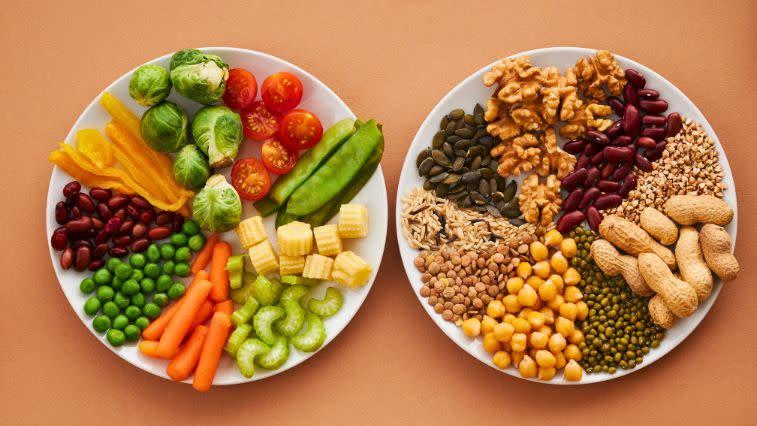What Kind of Diet Should I Follow to Support My Goals? Advice From a Registered Dietitian
Our content strives to support, inform, and motivate you to meet your health goals. We want to be your trusted source of expert- and science-backed info dispensed in simple, actionable ways. Read our Editorial Guidelines.
For most of us, a healthy diet looks very similar with the same basic principles. We should all drink plenty of water, eat several servings of fruits and vegetables per day, include good protein sources, and eat reasonable portion sizes of foods that aren’t highly processed.
However, if you have a specific diet goal, you may need to focus more on key diet changes for that goal. As a registered dietitian, I help clients make these changes all the time. Read below to learn some tips I use to help clients with these goals: weight loss, improved digestion, better heart health, and more energy.
What does a healthy diet for most people look like?
You don’t need to follow a particular diet plan like Whole30, South Beach, or Weight Watchers to be healthy. Instead, you should focus on general concepts to meet your goals.
For most people, a healthy diet consists of the following general guidelines based on the Dietary Guidelines for Americans:

Aim to include a variety of vegetables each day
Add in a few servings of fruit per day
Choose primarily whole grains, like quinoa, brown rice, whole grain bread, barley, oatmeal
Include lean sources of protein, such as beans, chicken breast, pork loin, tofu, fish
Add in some milk or milk substitutes every day, but choose nonfat or low-fat options if you use cow’s milk
Choose healthy fats, like avocadoes and olive oil
Drink plenty of water each day
Limit added sugars, especially in drinks and snacks
Eat sweets and treats in moderation
Diet Tweaks for Common Nutrition Goals
To find the right diet for your body and health needs, consider your nutrition goals and your overall health status. Most of the following nutrition tips would help most people eat healthier, but focusing on diet changes for a specific purpose might give you more direction.
Weight loss
I’ve seen many clients in my career who’ve tried extreme measures to lose weight, such as gimmicky diets, limiting carbs too much, and eating too few calories. These changes are often impossible to maintain, make you think about food all day, and take the joy out of eating. Quick fixes usually don’t work and aren’t good for you long term.
Instead of an extreme change to drop weight fast, I recommend smaller, more manageable changes that promote gradual weight loss and build long-lasting healthy habits.
Changes that I recommend to my clients for weight loss include:
Don’t count calories, but monitor portion sizes. Use a concept like the Plate Method to adjust your portions of different food groups at meals without measuring.
Increase your intake of non-starchy vegetables, such as celery, spinach, broccoli, green beans, and peppers. Eat vegetables at lunch and dinner, and try to eat them for snacks to fill you up and increase your intake of health-boosting nutrients. Add in a side of roasted broccoli at dinner, and try a snack of carrot or celery sticks dipped in a small serving of peanut butter.
Cut out sugary beverages. Regular soda has about 150 calories per 12-ounce serving. If you replace an afternoon soda with a glass of water or an unsweetened tea with lemon, you’ll quickly eliminate some empty calories from your diet.
Prepare ahead of time. Make one healthy batch recipe on Sunday so you have leftovers to eat all week. You could prepare a pot of vegetable and brown rice soup and keep it in the refrigerator for easy lunches or a simple dinner on a night you’re short on time.
Eat at regular intervals throughout the day, about every 2.5-3 hours. This should prevent you from eating large servings of food at the next meal or reverting to old habits like eating a candy bar after you waited too long to eat lunch.
Practice mindfulness. Sit at a table for meals, and eliminate distractions. Focus on what you’re eating and enjoy the flavors.
Improved Digestion
Many clients come to registered dietitians due to digestion issues, which include constipation, diarrhea, gassiness, or bloating. The following methods help improve digestive health:
Optimize your fiber intake. Most people need to eat more fiber. According to the 2020 Dietary Guidelines, 90 percent of women and 97 percent of men don’t meet the recommended fiber intake. In addition to helping with bowel movements, increasing fiber intake can reduce the risk of coronary heart disease.
The general rule is to eat about 14 grams of fiber for every 1000 calories your body needs. For most adults, an intake between 22-34 grams of fiber per day is enough.
To increase fiber intake, focus on adding natural fiber found in food first versus supplements. By adding in more whole grains, fruits, and vegetables, you’ll benefit from the other natural nutrients found in those foods, not just fiber.
Food sources of fiber include:
Whole grain breakfast cereals
Oats
Beans
Lentils
Apples
Berries, especially blackberries and raspberries
Chia seeds
Almonds

Source: Anna Shvets / Pexels
Drink enough water. If you’re having trouble with constipation, make sure you’re drinking enough water. Monitor the color of your urine to see if you’re properly hydrated. In general, a lighter color means better hydration. No exact amount of water per day works for every person, but try adding a glass of water right when you wake up every morning and carry a water bottle throughout the day to increase your fluid intake.
Include probiotics in your everyday diet. Probiotics are a type of healthy bacteria. Some research shows that probiotics have some health benefits, including helping with diarrhea and constipation.
Food sources of probiotics include:
Kombucha
Sauerkraut
Yogurt with live active cultures
Kefir
Tempeh
Miso
Lacto-fermented pickles
You could also try an over-the-counter probiotic, though efficacy varies by strain and dose of probiotic.
A Healthier Heart
For my clients who need to improve their heart health, such as improving blood pressure or cholesterol levels, I use guidance from the American Heart Association (AHA) to help them make diet and lifestyle changes.
According to the 2021 American Heart Association Dietary Guidance, Americans should follow these guidelines for heart health:
Maintain a healthy body weight
Eat plenty of fruits and vegetables, and aim for a variety every day
Choose whole grains more than refined or processed grains
Choose healthy sources of protein, with a focus on plant protein
Avoid animal fats like butter or lard and choose liquid plant oils instead (olive oil, safflower oil)
Limit sodium and prepare foods with limited amounts of salt
Minimize processed meats, added sugars, and ultra-processed foods
Limit alcohol intake if you drink now, or don’t start drinking alcohol
To move in the right direction, work first on your protein sources. For optimal heart health, lean protein sources or plant protein sources are preferred. Try to include nuts, beans, tofu, fish with healthy fats like salmon, lean cuts of chicken or other meats, and low-fat dairy.
Consume less highly-processed meats, like bacon, sausage, and chicken nuggets. If you’re just starting with this, try adding one plant-based protein source per day, such as making “tuna” salad from chickpeas or adding a serving of beans to a salad at lunch.
Increased Energy
To change your diet to increase your energy levels, first consider these factors:
Are you eating enough?
Does your diet contain adequate carbohydrates, protein sources, and healthy fats?
Do you eat regularly throughout the day?
According to Kelsey Costa, MS, RDN, the founder of Nutrition Insights, eating a whole food, plant-based diet could help you feel more energetic. She advises “consuming whole and minimally processed plant-based foods such as fruits, vegetables, whole grains, legumes, nuts, and seeds.”
Make sure you’re consuming enough protein. Kelsey states, “Protein is vital for muscle maintenance and energy levels. Plant-based proteins (legumes, tofu, tempeh, nuts/seeds) and lean animal proteins (fish, poultry breast, eggs) are great options to include.”
Most importantly, make sure you’re consuming enough carbohydrates since carbs are the body’s main fuel source. Kelsey notes that “consuming adequate amounts of carbs throughout the day will help ensure a steady energy supply. Aim for 45-65% of calories from carbs, focusing on complex carbohydrates like whole grains, legumes, and sweet potatoes.”
If you need a quick energy boost, such as before a workout or to make it through an afternoon meeting, she says to eat “fast-absorbing, whole-food carbohydrates such as fresh or dried unsweetened fruit.”
The Bottom Line
If you’re just starting on a healthy lifestyle journey, start by making the broad changes that are recommended for everyone, such as increasing your fruit and vegetable intake, watching portion sizes, limiting your added sugars, and drinking more water.
If you have specific health goals in mind, such as focusing on heart health, weight loss, increasing your energy levels, or improving digestion, try to make targeted changes to support those goals. Remember that even small changes can make a difference in your overall health, so there’s no need to be frustrated if you don’t notice results immediately.
If you need more personalized help or have a chronic health problem, contact a registered dietitian to help you make a customized plan based on your health history.